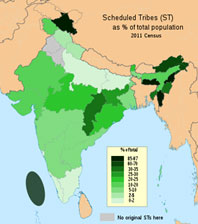| Scheme of Skill Development Programmes under Cluster Tribal Model Villages through Government Polytechnic Jammu,
India is a vast country with a population of approximately 135 crore. The Scheduled Tribe community comprises about 8.6% of India’s population. There is a visible difference in rural and urban, rich and poor, highly educated and lesser educated, forward and backward areas.
Sr. |
Faculty Name |
Designation |
Qualification |
1 |
Rajesh Khajuria
(Incharge ST) |
HOD |
B. Tech Automobile Engg. |
The following are the scheduled tribes residing in Jammu and Kashmir:

- Bakarwal
- Balti
- Beda
- Bot, Boto
- Brokpa, Drokpa, Dard, Shin
- Changpa
- Gaddi
- Garra
- Gujjar
- Mon
- Purigpa
- Sippi
While resourceful people, particularly those living in urban areas, have had access to better education and professional training, but vast majority of those who live in rural/ tribal areas and slums are lesser educated and hardly undergo any technical, professional and vocational training. In fact, for most of such people, quality education and higher technical and professional education is unaffordable. In terms of career options, such lesser educated and not so fortunate people tend to work in low paid unorganized sector. Per person productivity of such persons works out to be a small fraction of productivity of those who work in organized sector of Indian economy. In an increasingly competitive economic environment of our country, the unorganized sector, which is so important for the country, needs to increase the productivity of its manpower for its survival and growth. Yet another paradox before the Indian informal sector is that it can not afford employing highly educated and professionally trained manpower which usually aspires for highly challenging, rewarding and satisfying career. The only option available before the Indian informal sector is to depend upon relatively low paid manpower trained through non-formal system of skill development. There is, therefore, an urgent need to train millions of persons every year through a countrywide network of non-formal skill development.
Such non-formal skill training should attract beneficiaries from all
cross-sections of Indian society with special emphasis on Scheduled Tribes. Details of trades for Skill Development of Schedule Tribes populations in Govt. Polytechnic Jammu
| S.No. |
Name of the Course |
Duration |
Total Students In a batch |
No. Of batches in a year |
Name of the instructor |
| 01 |
Carpentry |
Six months |
20 |
02 |
Sh. Sandeep Singh |
| 02 |
Computer Operator |
Six months |
20 |
02 |
Sh. Viney Kumar |
| 05 |
Fashion Designing |
Six months |
20 |
02 |
Smt Surekha Rani |
|